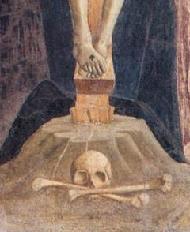Lent II “Dark Faith”
Life is difficult. Awakening to personal complicity with evil in the world is even more difficult. Aligning with Christ against injustice, oppression, exploitation, and violence, propels you to the Cross. In Lent, giving up illusion is the primary sacrifice: illusions about God, the world, safety, self-satisfaction. Or, even the illusion of an easier, friendlier Jesus of Galilee and Epiphany without embracing the suffering Jesus of Jerusalem and Holy Week.
Sometime you also have to abandon the illusion of what you previously called “faith.” As you mature as a Christian, faith draws you to a dark realm beyond reason. Reason is a placemark of discernment, but the content of the pages can shock with their unreasonable wonder, complexity, beauty, horror, emptiness.
All the scripture readings for Sunday reference faith in some way. God initiates a reciprocal pact of faith with Abraham. The Psalmist remembers God’s former faithfulness in order to find faith in present distress despite the jeering of companions. Paul considers how Abraham’s irrational faith blessed him. Jesus asks his followers to follow him in faith to the Cross.
In mystical prayer the “ascent to truth” begins in dark faith. Darkness enters the soul and the real journey of contemplation begins. Give up the illusion of light, consolation, a sense of Presence. John of the Cross said, “He who seeks not the cross of Christ, seeks not the glory of Christ.”
|
 |
| Crucifixion, Andrea Del Castagnoc 1455 (Detail) |
|
Meditation One
Losing your life
Now as it was the spirit of the world that nailed our Blessed Lord to the Cross; so every man that has the spirit of Christ, that opposes the world as he did, will certainly be crucified by the world, in some way or other.
William Law 1686-1761, A Serious Call to the Devout Life XVII
Those who want to save their lives will lose it, and those who lose their lives for my sake and for the gospel will save it. – Jesus, Mark 8:35
|
|
Meditation Two
Nights of Faith
Saint John of the Cross does not hesitate to apply his principles to every kind of “clear knowledge” about God, even if it should come to the soul in the form of a vision or revelation. All these experiences are less perfect than the union of the soul with God in “pure faith,” that is to say, in the “night” of contemplation. … The only proximate means of union with God is faith. No vision, no revelation, however sublime, is worth the smallest act of faith, in his eyes.
- Thomas Merton, Ascent to Truth
God does not die on the day when we cease to believe in a personal deity, but we die on the day when our lives cease to be illumined by the steady radiance, renewed daily. Of a wonder, the source of which is beyond all reason.
- Dag Hammarskjöld, Markings
|
 |
| Master of San Francisco Bardi, 14th century |
|
|
Meditation Three
The Paradox of Prayer
I know that the prayers of those other parents and children were not less worthy than mine. I am not ungrateful, but I can’t forget the children who were left behind and I do not know what my prayer or my love or my ministry would be like had I not carried my children out of the hospital corridors alive and while. Yet I sensed at the time that God was present in death as well as if life. It was not a sense of comfort of assurance that I experienced, but a love that did not depend on life or death.
A hospital corridor can be a mysterious place, a terrible and holy threshold upon the boundary of the soul. Here you will find an opening through which you might apprehend and embrace unexperienced aspects of God. Uprooted from your ordinary days, the hospital confounds the peaceful soul with the realization that the God of daily living is also the God of sudden dying. The God of the comforting parish sanctuary is also the God of the Intensive Care Unit. The God of beeswax candle and incense is the God of vomit and pus; the God of white linen and embroidered chasuble is the God of plastic curtain and sweaty sheet; the God of organ and flute is the God of squeaky gurney wheels and crying children; the God of deep port wine and delicately embossed communion bread is the God of infected blood and wounded flesh.
The God of all those corridor smells and sights and sounds is also the God of profound silence. When despair has obliterated ordinary prayer, when the psalms fail and all words are stupid and meaningless, the mantle of loneliness surrounding me becomes a mantle of dark and wordless love. This darkness reveals the paradox of prayer: in the absence of God, all there is, is God.
-SG, Grace’s Window
|
The Last Word
Surrender
Why should I be anxious? It is not up to me to think of myself. It is up to me to think of God. And it is up to God to think of me.
-Simone Weil
|
|
Second Sunday in Lent
O God, whose glory it is always to have mercy: Be gracious to all who have gone astray from your ways, and bring them again with penitent hearts and steadfast faith to embrace and hold fast the unchangeable truth of your Word, Jesus Christ your Son; who with you and the Holy Spirit lives and reigns, one God, for ever and ever. Amen.
|
|